Follow link to register:
Category Archives: Uncategorized
Archbishop Francesco Panfilo, SDB on 2019 Advent Season the the First Annual Pilgrimage of the Holy Family of Nazareth


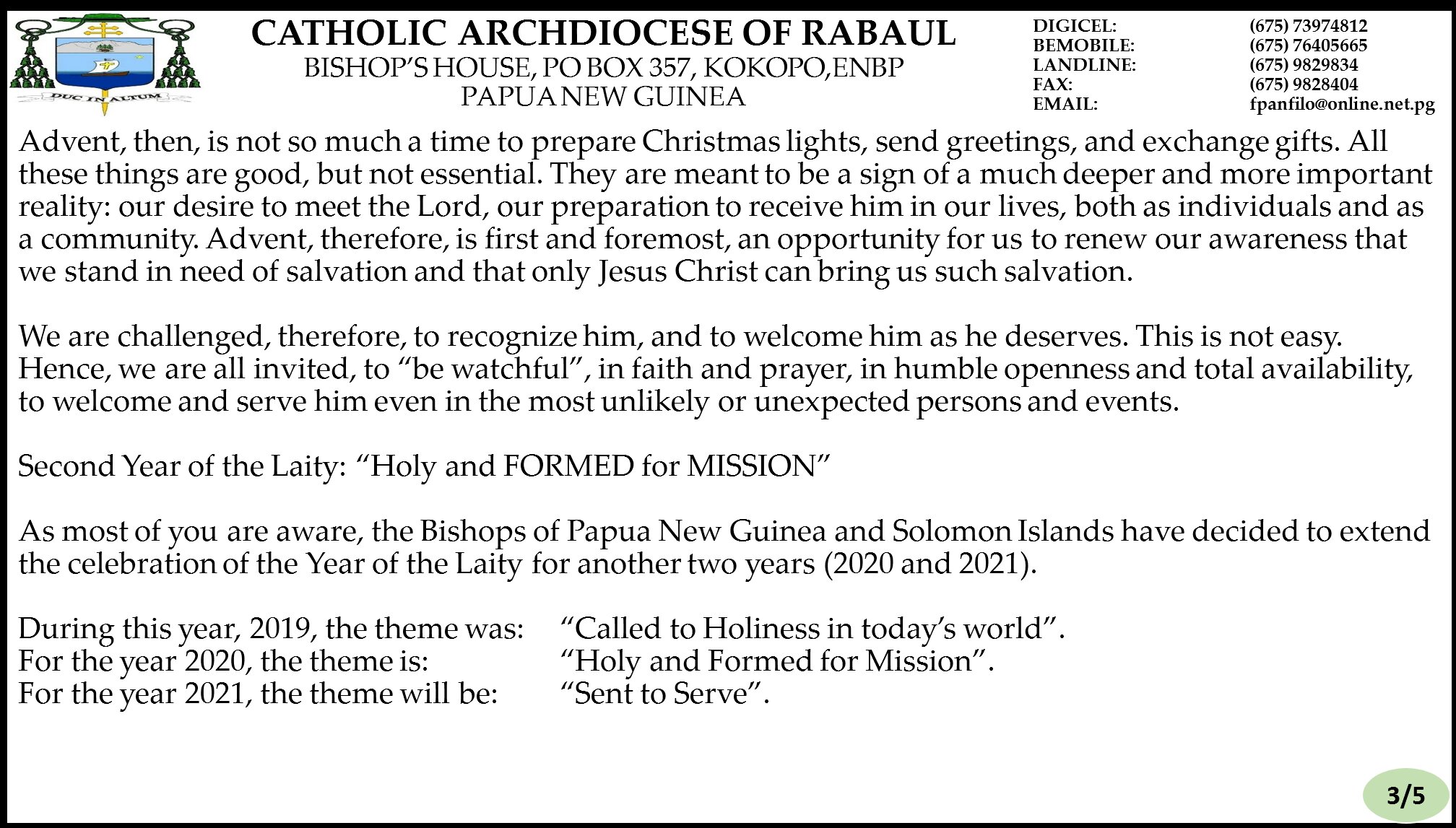
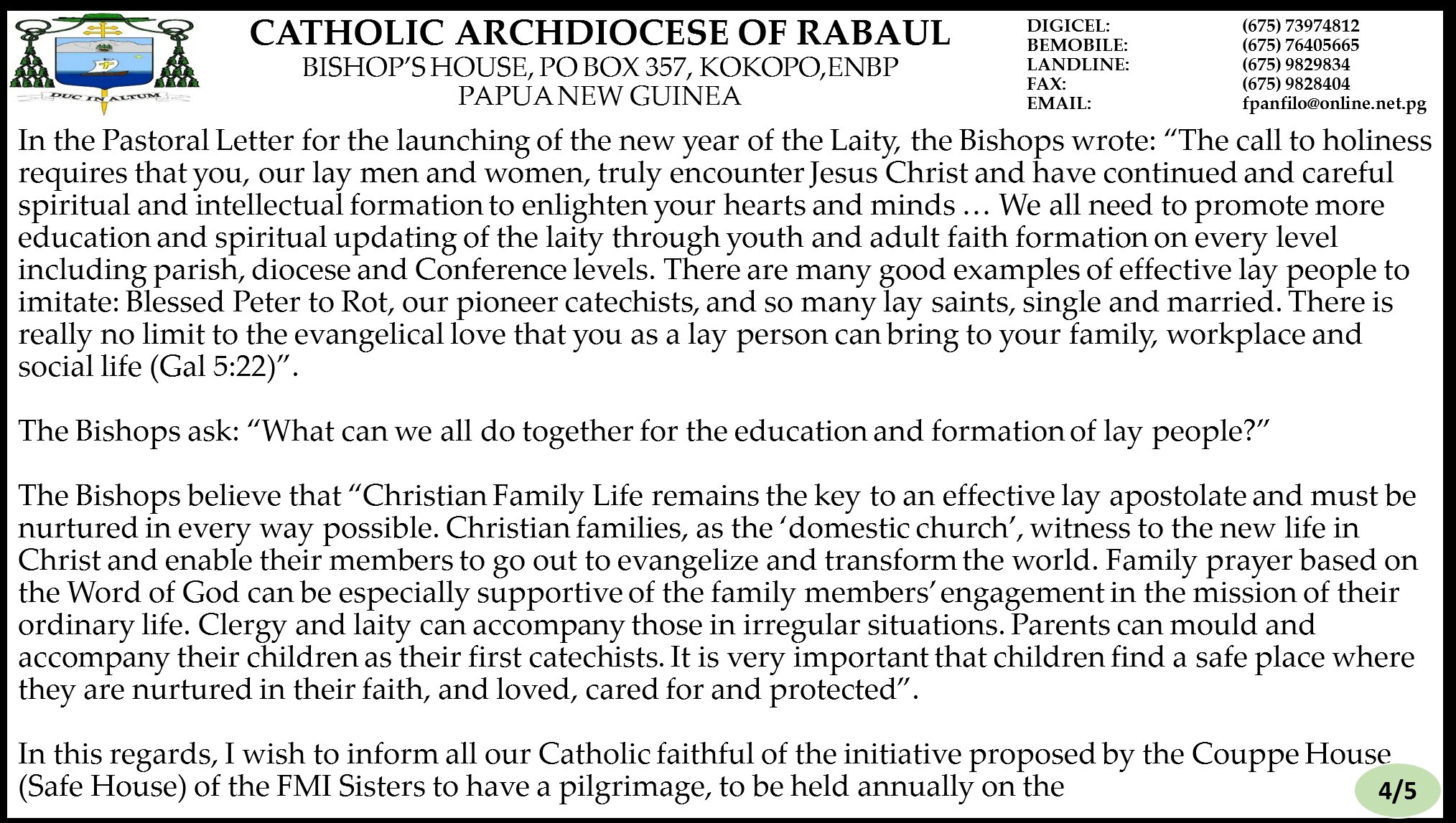
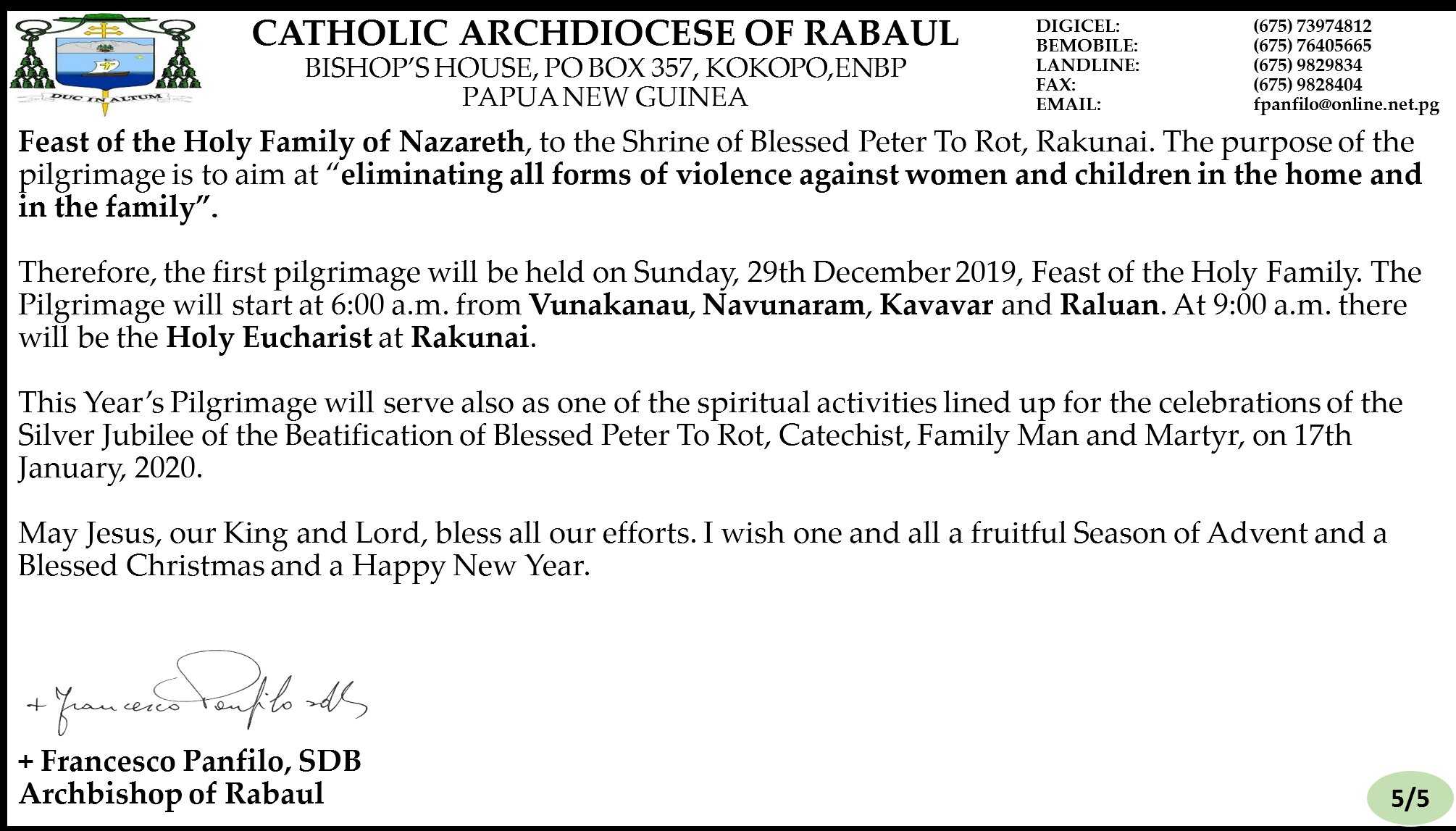
Priest: Fatima Warnings Fulfilled in Amazon Synod – Worst Fears Realised… — Catholic Truth
Comment: As the priest interviewed in the video indicates, silence is not an option at this late stage in the crisis. We must all speak out now, in every way possible, to highlight the “new pathways” being pursued by Pope Francis, to create what is, in fact, a new Church, opposed to the Church founded […]
Priest: Fatima Warnings Fulfilled in Amazon Synod – Worst Fears Realised… — Catholic Truth
Statement of Archbishop Francesco Panfilo, SDB to all Doctors and Nurses of Catholic Run Hospitals within the Metropolitan Archdiocese Of Rabaul
CALLING ALL CATHOLIC FAITHFLUL TO A CRUSADE OF PRAYER AND FASTING
FROM 17TH – 26TH SEPTEMBER 2019
Various Prelates (Bishops & other high ecclesiastical dignitaries) and various Laity and Lay Institutions have warned that the Instrumentum Laboris (Working Instrument) for the upcoming Pan-Amazon Synod in Rome contains SIX SERIOUS THEOLOGICAL ERRORS and HERESIES inserted by its authors.
This Document will serve as a basis for discussions in this synod and may result in this errors and heresies being approved.
Therefore Cardinal Raymond Burke and Bishop Athanasius Schneider co-authored a Declaration warning about these six errors and heresies. The Declaration is attached below for you to read for yourself the errors and the Official Church Teachings that condemns them.
Catholic faithful everywhere are called to join in a 40 day Crusade of Prayer and Fasting from 17th – 26th of September for the following intensions:
- THAT THE THEOLOGICAL ERRORS AND HERESIES INSERTED IN THE INSTRUMENTUM LABORIS DOCUMENT MAY NOT BE APPROVED DURING THE SYNODAL ASSEMBLY.
- THAT PARTICULARLY POPE FRANCIS, IN THE EXERCISE OF THE PETRINE MINISTRY, MAY CONFIRM HIS BRETHREN IN THE FAITH BY AN UNAMBIGUOUS REJECTION OF THE ERRORS OF THE INSTRUMENTUM LABORIS AND THAT HE MAY NOT CONSENT TO THE ABOLITION OF PRIESTLY CELIBACY IN THE LATIN CHURCH BY INTRODUCING THE PRAXIS OF THE ORDINATION OF MARRIED MEN, THE SO-CALLED “VIRI PROBATI”, TO THE HOLY PRIESTHOOD.
“During the forty-day crusade of prayer and fasting, we propose to pray daily at least one decade of the Holy Rosary and to fast once a week for the above mentioned intentions. According to the tradition of The Church, fasting consists in eating only one full meal during the day, and additionally, one may eat up to two smaller meals. Fasting on bread and water is also recommended to those who are able to do so,”
Cardinal Burke and Bishop Schneider concluded the Declaration and the invitation to Prayer and Fasting as follows:
The theological errors and heresies, implicit and explicit in the Instrumentum Laboris of the imminent Special Assembly of the Synod of Bishops for the Pan-Amazon, are an alarming manifestation of the confusion, error and division which beset the Church in our day. No one can excuse himself from being informed about the gravity of the situation and from taking appropriate action for love of Christ and of His life with us in the Church. Above all, all the members of Christ’s Mystical Body, before such a threat to her integrity, must pray and fast for the eternal good of her members who risk being scandalized that is led into confusion, error and division by this text for the Synod of Bishops. Moreover, every Catholic, as a true soldier of Christ, is called to safeguard and promote the truths of the faith and the discipline by which those truths are honored in practice, lest the solemn assembly of the Bishops in Synod betray the mission of the Synod, which is “to assist the Roman Pontiff with their counsel in the preservation and growth of faith and morals and in the observance and strengthening of ecclesiastical discipline” (can. 342). On October 13, 2019, during the coming Special Assembly of the Synod of Bishops for the Pan-Amazon, there will take place the Canonization of Blessed Cardinal John Henry Newman. May the Holy Father and all the members of the Special Assembly of the Synod of Bishops for the Pan-Amazon hear and accept the following luminous teaching of this newest Saint of the Church, in which he warned against theological errors similar to the above-mentioned errors in the Instrumentum Laboris:
“Private creeds, fancy religions, may be showy and imposing to the many in their day; national religions may lie huge and lifeless, and cumber the ground for centuries, and distract the attention or confuse the judgment of the learned; but on the long run it will be found that either the Catholic Religion is verily and indeed the coming in of the unseen world into this, or that there is nothing positive, nothing dogmatic, nothing real, in any of our notions as to whence we come and whither we are going”
(Discourses to Mixed Congregations, XIII).
Fr Giorgio Licini General Secretary of the PNGSI CBC challenges Australia’s position on refugees, climate change
The general secretary of the Papua New Guinea Catholic Bishops Conference is taking Australia to task over its offshore detention centres and its attitude to climate change.
While Australia has plans to reconnect with the Pacific, Giorgio Licini says Australia’s arrogance and its refusal to listen to its near neighbours will leave it isolated.
Don Wiseman spoke with Fr Licini who elaborated on his comment that Australia needs to “lead through kindness” on refugees and the climate crisis.
Pray for your local priest

Pray for your local priests that they may always celebrate the Holy Eucharist with us worthily.
HOMILY OF HIS HOLINESS POPE FRANCIS during Holy Mass on the Solemnity of Pentecost (9 June 2019)
Pentecost arrived, for the disciples, after fifty days of uncertainty. True, Jesus had risen. Overjoyed, they had seen him, listened to his words and even shared a meal with him. Yet they had not overcome their doubts and fears: they met behind closed doors (cf. Jn 20:19.26), uncertain about the future and not ready to proclaim the risen Lord. Then the Holy Spirit comes and their worries disappear. Now the apostles show themselves fearless, even before those sent to arrest them. Previously, they had been worried about saving their lives; now they are unafraid of dying. Earlier, they had huddled in the Upper Room; now they go forth to preach to every nation. Before the ascension of Jesus, they waited for God’s kingdom to come to them (cf. Acts 1:6); now they are filled with zeal to travel to unknown lands. Before, they had almost never spoken in public, and when they did, they had often blundered, as when Peter denied Jesus; now they speak with parrhesia to everyone. The disciples’ journey seemed to have reached the end of the line, when suddenly they were rejuvenated by the Spirit. Overwhelmed with uncertainty, when they thought everything was over, they were transformed by a joy that gave them a new birth. The Holy Spirit did this. The Spirit is far from being an abstract reality: he is the Person who is most concrete and close, the one who changes our lives. How does he do this? Let us consider the Apostles. The Holy Spirit did not make things easier for them, he didn’t work spectacular miracles, he didn’t take away their difficulties and their opponents. Rather, the Spirit brought into the lives of the disciples a harmony that had been lacking, his own harmony, for he is harmony.
Harmony within human beings. Deep down, in their hearts, the disciples needed to be changed. Their story teaches us that even seeing the Risen Lord is not enough, unless we welcome him into our hearts. It is no use knowing that the Risen One is alive, unless we too live as risen ones. It is the Spirit who makes Jesus live within us; he raises us up from within. That is why when Jesus appears to his disciples, he repeats the words, “Peace be with you!” (Jn 20:19.21), and bestows the Spirit. That is what peace really is, the peace bestowed on the Apostles. That peace does not have to do with resolving outward problems – God does not spare his disciples from tribulation and persecution. Rather, it has to do with receiving the Holy Spirit. The peace bestowed on the apostles, the peace that does not bring freedom from problems but in problems, is offered to each of us. Filled with his peace, our hearts are like a deep sea, which remains peaceful, even when its surface is swept by waves. It is a harmony so profound that it can even turn persecutions into blessings. Yet how often we choose to remain on the surface! Rather than seeking the Spirit, we try to keep afloat, thinking that everything will improve once this or that problem is over, once I no longer see that person, once things get better. But to do so is to stay on the surface: when one problem goes away, another arrives, and once more we grow anxious and ill at ease. Avoiding those who do not think as we do will not bring serenity. Resolving momentary problems will not bring peace. What makes a difference is the peace of Jesus, the harmony of the Spirit.
At today’s frenzied pace of life, harmony seems swept aside. Pulled in a thousand directions, we run the risk of nervous exhaustion and so we react badly to everything. Then we look for the quick fix, popping one pill after another to keep going, one thrill after another to feel alive. But more than anything else, we need the Spirit: he brings order to our frenzy. The Spirit is peace in the midst of restlessness, confidence in the midst of discouragement, joy in sadness, youth in aging, courage in the hour of trial. Amid the stormy currents of life, he lowers the anchor of hope. As Saint Paul tells us today, the Spirit keeps us from falling back into fear, for he makes us realize that we are beloved children (cf. Rom 8:15). He is the Consoler, who brings us the tender love of God. Without the Spirit, our Christian life unravels, lacking the love that brings everything together. Without the Spirit, Jesus remains a personage from the past; with the Spirit, he is a person alive in our own time. Without the Spirit, Scripture is a dead letter; with the Spirit it is a word of life. A Christianity without the Spirit is joyless moralism; with the Spirit, it is life.
The Holy Spirit does not bring only harmony within us but also among us. He makes us Church, building different parts into one harmonious edifice. Saint Paul explains this well when, speaking of the Church, he often repeats a single word, “variety”: varieties of gifts, varieties of services, varieties of activities” (1 Cor 12:4-6). We differ in the variety of our qualities and gifts. The Holy Spirit distributes them creatively, so that they are not all identical. On the basis of this variety, he builds unity. From the beginning of creation, he has done this. Because he is a specialist in changing chaos into cosmos, in creating harmony. He is a specialist in creating diversity, enrichment, individuality. He is the creator of this diversity and, at the same time, the one who brings harmony and gives unity to diversity. He alone can do these two things.
In today’s world, lack of harmony has led to stark divisions. There are those who have too much and those who have nothing, those who want to live to a hundred and those who cannot even be born. In the age of the computer, distances are increasing: the more we use the social media, the less social we are becoming. We need the Spirit of unity to regenerate us as Church, as God’s People and as a human family. May he regenerate us! There is always a temptation to build “nests”, to cling to our little group, to the things and people we like, to resist all contamination. It is only a small step from a nest to a sect, even within the Church. How many times do we define our identity in opposition to someone or something! The Holy Spirit, on the other hand, brings together those who were distant, unites those far off, brings home those who were scattered. He blends different tonalities in a single harmony, because before all else he sees goodness. He looks at individuals before looking at their mistakes, at persons before their actions. The Spirit shapes the Church and the world as a place of sons and daughters, brothers and sisters. These nouns come before any adjectives. Nowadays it is fashionable to hurl adjectives and, sadly, even insults. It could be said that we are living in a culture of adjectives that forgets about the nouns that name the reality of things. But also a culture of the insult as the first reaction to any opinion that I do not share. Later we come to realize that this is harmful, to those insulted but also to those who insult. Repaying evil for evil, passing from victims to aggressors, is no way to go through life. Those who live by the Spirit, however, bring peace where there is discord, concord where there is conflict. Those who are spiritual repay evil with good. They respond to arrogance with meekness, to malice with goodness, to shouting with silence, to gossip with prayer, to defeatism with encouragement.
To be spiritual, to savour the harmony of the Spirit, we need to adopt his way of seeing things. Then everything changes: with the Spirit, the Church is the holy People of God, mission is not proselytism but the spread of joy, as others become our brothers and sisters, all loved by the same Father. Without the Spirit, though, the Church becomes an organization, her mission becomes propaganda, her communion an exertion. Many Churches spend time making pastoral plans, discussing any number of things. That seems to be the road to unity, but it is not the way of the Spirit; it is the road to division. The Spirit is the first and last need of the Church (cf. Saint Paul VI, General Audience, 29 November 1972). He “comes where he is loved, where he is invited, where he is expected” (Saint Bonaventure, Sermon for the Fourth Sunday after Easter).
Brothers and sisters, let us daily implore the gift of the Spirit. Holy Spirit, harmony of God, you who turn fear into trust and self-centredness into self-gift, come to us. Grant us the joy of the resurrection and perennially young hearts. Holy Spirit, our harmony, you who make of us one body, pour forth your peace upon the Church and our world. Holy Spirit, make us builders of concord, sowers of goodness, apostles of hope.
HOMILY OF HIS HOLINESS POPE FRANCIS during Holy Mass on the Solemnity of Pentecost (9 June 2019)
Readings for the 5th Sunday of Easter
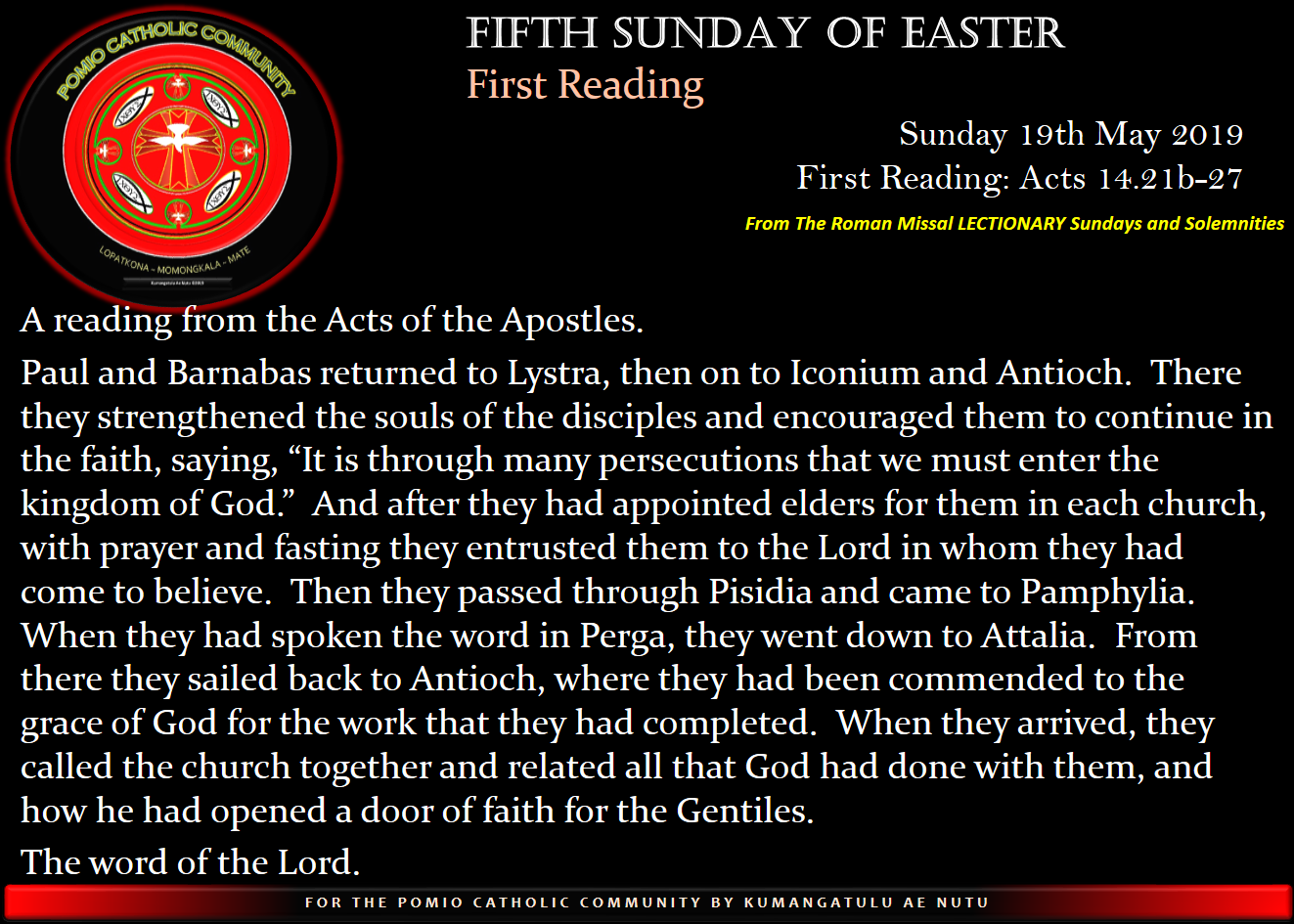
The first reading is taken from Acts 14:21-27. Last week we heard of St. Paul’s experiences at Antioch in Piscidia during his first missionary journey. Their visit had ended on a sour note as Paul and Barnabas were expelled. The reading ended with “the two shook the dust from their feet in protest and went on to Iconium. Their disciples knew only how to be filled with joy and the Holy Spirit”. Today we hear of the conclusion of this first missionary journey where Paul and Barnabas retrace their steps back through Antioch in Piscidia on their way back to Antioch in Syria where they had begun their journey.


The second reading is from the Book of Revelation 21:1-5a. For the past three weeks we have had as our second reading an account of John’s privileged vision of the heavenly liturgy where he has seen the eternal sacrifice being offered to God the Father by His Son, The New and Eternal High priest and sacrifice. We have heard also the prayers being offered by the faithful. We now go to the end of John’s account as he describes the Heavenly Jerusalem. It was Jesus’ mission to go to the earthly Jerusalem to offer His sacrifice — this shows us the path that we must follow to reach the Heavenly Jerusalem so that we can dwell with Him there forever.
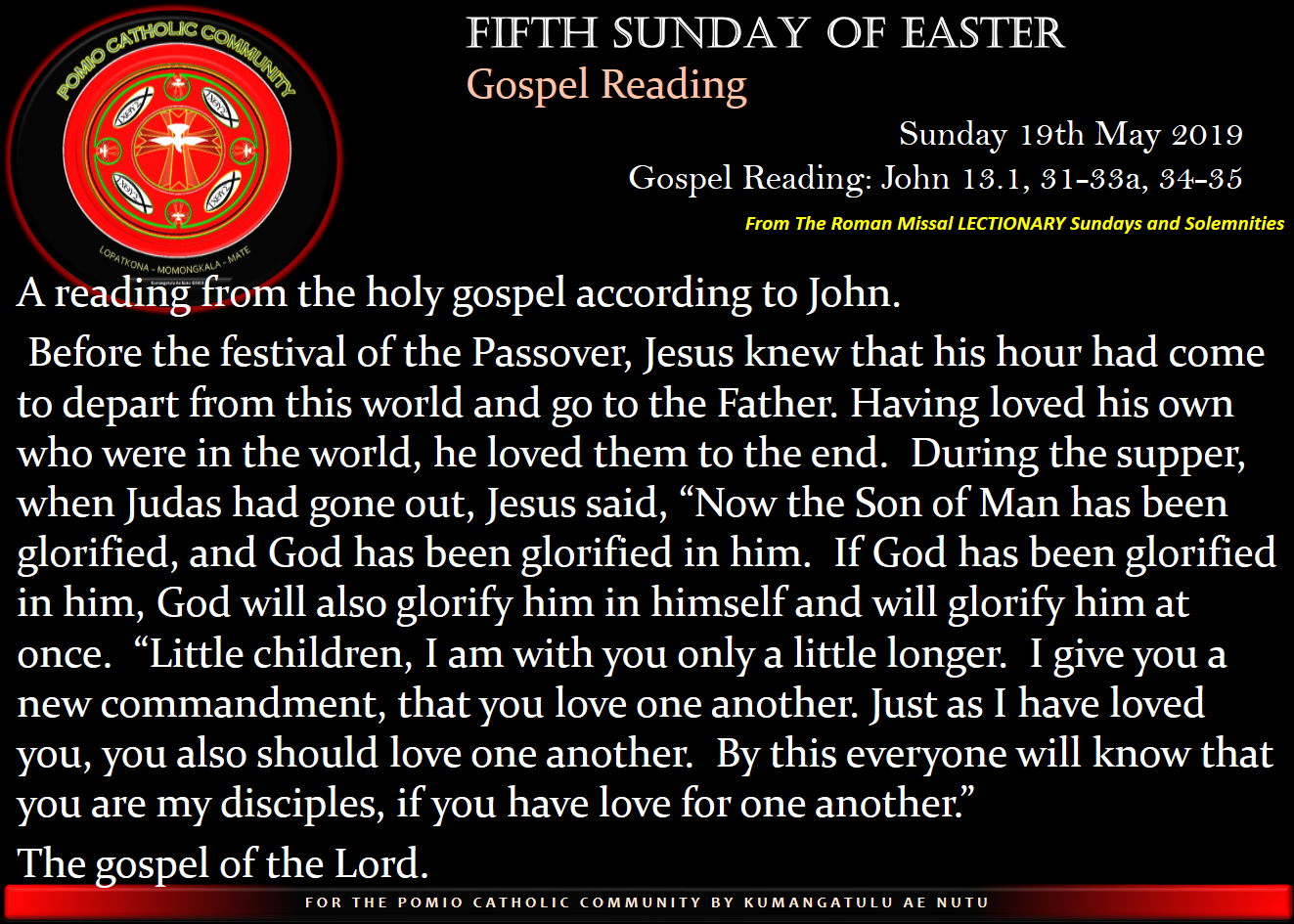
The Gospel is from John 13:31-33a, 34-35.We are disciples, followers of Christ, but how many of us would pass the test that Christ himself lays down for deciding who are his true followers? The word “charity” unfortunately has come to have a very restricted meaning in our present-day vocabulary. It signifies giving an alms, a gift of money to a needy person. This is but a very small part of the true charity, true love of neighbor which Christ made the distinguishing mark of the true Christian. He who truly loves his neighbor must be interested, first and foremost, in those things which concern that neighbor’s most important purpose in life, his eternal salvation.
Here is where so many good Christians fail in true charity. Effective interest in missionary activity is a case in point. Practical help in parochial matters, taking part in the various societies which are intended to build up and strengthen the faith and the devotion of the members of the parish is another obligation of true charity. So many seem to think it is no concern of theirs but it is. Advising and encouraging, with true Christian kindness, a neighbor who is beginning to grow lax in his attendance to his Christian duties, or who is forming habits or alliances which, if unchecked, will bring misery and suffering to his family, and scandal to the neighborhood, and even the possibility of his own eternal destruction, is also an exercise of real Christian charity.
There are thousands of broken homes today which would not be broken if there was true charity in those homes not only in the heart of the offender but in the hearts of the offended. There are thousands in jails and in hospitals of rehabilitation today who would not be there if their families and neighbors fulfilled their obligation of Christian charity. There are many, far too many, lapsed Catholics in the world today, who would not have lapsed had true charity been practised by their relatives and neighbors. And, last but not least, there are millions of people who have remained outside the Church of Christ because the hall-mark of charity which Christ said was its distinguishing mark was tarnished or invisible. Each one of us could, with great profit, spend a few moments today looking into ourselves and comparing our thoughts and our words and our actions with the thoughts, words and actions of love which Christ expects from his followers.
It is never too late to mend. Begin today to take a true Christian interest in the spiritual fate of your family and neighbors. Where words have already failed perhaps, try prayer and example. The grace of God will cooperate with your sincere, charitable effort.
Excepted from The Sunday Readings, Fr. Kevin O’Sullivan, O.F.M.



You must be logged in to post a comment.